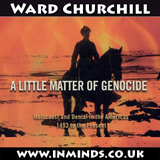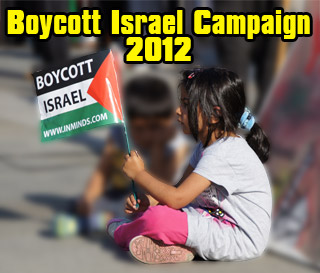
 Innovative Minds © 2014. All Rights Reserved. www.inminds.co.uk | ||||
|
Comment: A retired Christian priest explains why he now believes in boycotting Israel. Religion in today's world: Boycott Israel?Richard Kropf, Gaylord Herald Times One hesitates to use the tactic of boycotting any country, company or organization to make a point because in the process of cutting off all commerce, innocent people are inevitably hurt, at least temporarily, in the process.
This past Dec. 15, 13 leaders of practically all the Christian groups that still exist in the Holy Land, whether Catholic, Protestant or Orthodox, including the Greek, Latin and Armenian patriarchs of Jerusalem, signed what they call the âKairos-Palestineâ (âKairosâ meaning a critical point or moment) a statement calling on Christians around the world to begin a boycott of Israel.
But announcement recently by the Israeli government to go ahead with construction of 1,600 new housing units to displace Palestinian residents in the eastern part of Jerusalem only underlines and exacerbates the hopelessness of the situation. In fact, this past Dec. 15, 13 leaders of practically all the Christian groups that still exist in the Holy Land, whether Catholic, Protestant or Orthodox, including the Greek, Latin and Armenian patriarchs of Jerusalem, signed what they call the âKairos-Palestineâ (âKairosâ meaning a critical point or moment) a statement calling on Christians around the world to begin a boycott of Israel. The reason for this? It is because, as they say, after six decades of hoping things could be worked out, â⦠today we have reached a dead-end in the tragedy of the Palestinian people.â They then go on, in this 12-page document, to enumerate some 15 specific charges of repeated and continuing Israeli violations of human rights, UN resolutions and previous agreements, all this after criticizing âthe decision-makers [who] content themselves with managing the crisis rather than committing themselves to the serious task of finding a way to resolve it.â Perhaps we may see this particular criticism as unfair, particularly when we remember the repeated efforts made by American presidents, especially by Jimmy Carter in brokering the Camp David Accord between Israel and Egypt, the first President Bushâs withholding of guaranteed loans to Israel until they agreed to stop building more West Bank âsettlements,â and President Clintonâs repeated efforts to save the Oslo Accord. But as far as any of these efforts bringing any real resolution of the problem, the preface to this document does not hesitate to adopt Carterâs recent blunt description of the present Israeli policy (especially since the erection of the concrete barrier walls and chain-link and barbed-wire fences) as being a repeat of what once was of South Africaâs policy of racial âapartheid.â Apparently Bishop Tutu, the Nobel Peace-Prize winner who experienced apartheid first hand, agrees, as he has endorsed the Kairos-Palestine statement, which is supported as well by the Executive Secretary of the World Council of Churches. As for myself, Iâm also inclined to support it because of my own experience when I was living there for some months in the spring of 1981. Back then, things were still a bit better (no physical fences yet). Nevertheless, I still experienced the tensions under which Israelis live with their well-founded fear of terrorist reprisals â particularly the signs on the buses warning people to beware of (and report) any unattended packages. But whenever I passed into the Israeli-occupied West Bank (which began just a few hundred yards down the road from where I lived) I also experienced what it is like for Palestinians to have to keep passing through check-points or to have to live under the constant surveillance of occupying Israeli troops â with almost all of them carrying U.S.-made and supplied M-16 assault rifles. I often wondered: was there meant to be a deliberate message in the choice of weapons? If so, I was not at all surprised when walking alone through the Hinnom Valley (Gehenna in Matthewâs gospel) one Sunday afternoon, when a group of young Arab boys started throwing stones in my direction. Apparently I looked âJewishâ to them, and if so, I canât blame them for their angry feelings. (An older fellow, wearing traditional Arab robes, no doubt fearing an âincident,â chased them away from me.) On the other hand, when I talked, as I occasionally did, with Palestinian Christians who knew me to be an American, the conversation almost always ended with them pleading that I try to do something to change U.S. policies, reminding me that if it werenât for the USA, all this wouldnât be happening to them. As a result, I was not at all surprised to see on TV, after 9/11, pictures of Palestinians dancing in the streets, nor is it any mystery to me as to why so many Muslims â if not the few Christians left there â hate us. So should we boycott Israel to make a point? I think so, but only by gradually tightening the screws by disinvesting any holdings we might have in the major corporations doing business with the state of Israel, particularly with its military forces â a policy endorsed already by the Presbyterian Church in the USA since 2004, joined in 2008 by The Church of England. If so, the major targets would be Lockheed-Martin (the largest supplier of Israelâs own arms industry), General Electric (for its supplying parts for Apache attack helicopters â one of the major weapons used in the brutal Gaza retaliation operation a year ago) and Caterpillar â the firm that makes the armored bulldozers used to demolish Palestinian homes and other equipment to make room for illegal Israeli settlements. True, such an indirect boycott might be seen only as a token, but I think it might be a sign that speaks volumes and which, like the similar tactic used against the white supremacist government in South Africa back in the 1980s, and like what happened there, bring the decision-makers in Israel back to their senses. Or, as at least one Jewish Rabbi involved in the peace effort (and there are others â both here and in Israel) has said, rather than such tactics being seen as âanti-Semitic,â they are perhaps just what is needed âto save the Israelis from themselves.â Letâs pray and hope so. Richard Kropf is a retired priest and theologian who lives along the Black River. Source: http://www.gaylordheraldtimes.com/articles/2010/03/23/opinion/doc4ba8e9d96406f661725627.txt Also Of InterestPage URL: http://inminds.com/article.php?id=10323
|
|
Support Us
If you agree with our work then please support us.Campaigns INMINDS Facebook Live Feed Latest Video's
INMINDS Twitter Feed Tweets by @InmindsComFeatured Video's
You need Flash player 8+ and JavaScript enabled to view this video.
[all videos (over 200)..] Featured MP3 Podcast  "1763 in the Ohio river valley you got Lord Jeffrey Amherst committing to written order an instruction to his subordinate Henry Bouquet, having been defeated by Pontiac Ottawa confederacy in the field. The order essentially says that they have been defeated militarily and is therefore necessary for Amherst forces to request a peace, to sue for peace from Pontiacs people. He instructs Bouquet to convene a parlay with the Indian leadership for that purpose. And as is the custom, as is common courtesy among native populations as was known to the Brits at that time, it would be necessary for those who requested the council to give gifts to those requested to attend. Make those gifts, Amherst says, items taken from a smallpox infirmary in order, I'm going to quote directly now, this isn't a paraphrase: 'in order that we may extirpate this execrable race'. Now key is on this last word, had he said that we might eradicate the opposing combatants, their military capacity, their warriors.. what ever term he wanted to use, it would have been biological warefare. But he didn't say anything about that, he said the 'race'. His intent was to use biological means, to use disease, quite explicitly so, to eradicate an entire population group. And Bouquet was also kind enough to commit to writing in his response the next day, I have done as instructed, dispersing three blankets, two handkerchiefs and sundry other items, hopefully, he says, they will have the desired result. They did.. the lowest estimate of the number of people who died of smallpox as a result of that little gesture of friendship and goodwill is a 100,000!" American Indian scholar, activist in the struggle for liberation of Indigenous Peoples in America On the publication of the book 'A Little Matter of Genocide: Holocaust and Denial in the Americas, 1492 to the Present', 1997 [29min / 10Mb] [all podcasts..] Newsletter Feedback |
 |
 |
















































